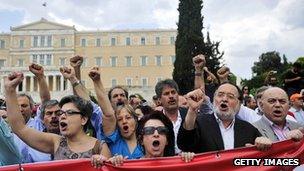IMF calls for further action to solve eurozone crisis
- Published

The IMF remains unpopular in many eurozone countries
The International Monetary Fund has called for more action to end the crisis in the eurozone.
The IMF wants greater progress made on repairing the balance sheets of banks, so that lending can be kick-started.
It also said that further cuts to interest rates by the European Central Bank may be necessary to boost growth.
The IMF praised eurozone authorities for taking action to stabilise financial markets, which reduced the risk of a break-up of the euro.
However, the IMF noted that despite the policy actions on many fronts, "growth remains elusive and high unemployment persists, especially among youth."
It predicted that the eurozone's GDP will contract by 0.6% this year, before expanding by 0.9% in 2014.
"Because policy space is limited, public debt ratios are very high (and still rising), and economic slack is already substantial, further negative shocksÔÇödomestic or external shocksÔÇöcould severely impact growth," the IMF said.
It called for more reforms in the banking sector, including the re-capitalisation of weak, but viable banks, and the closure of "non-viable" banks.
It also urged greater flexibility in the eurozone's labour market, including the removal of barriers to protected professions.
"Within countries, labour market reforms should continue to remove rigidities, raise participation, and, where necessary, promote more flexible bargaining arrangements," the IMF said.
Last month, the IMF called on France to lower its labour costs and halt tax hikes to boost both growth and its competitiveness.
It expects French unemployment to continue to rise, despite French President Francois Hollande's vow to reduce it by the end of the year.